
Jonathan Richman | Dogmatics Photo | Paley Brother's Story
Boston Sound Home Page
Earth Opera
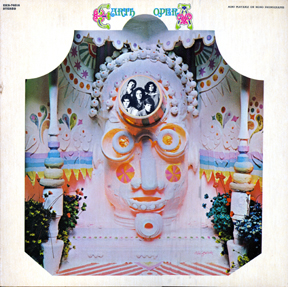 |
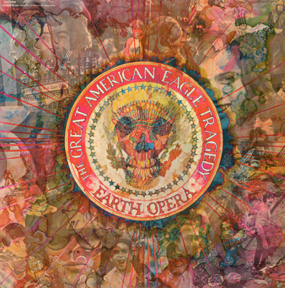 |
Earth Opera come off better than many Boston Sound groups because they had chart success and sported some credible players, i.e. Peter Rowen and David Grisman. John Cale plays on the second album and Jac Hotzman is the production supervisor for both albums.
Earth Opera did everything with
an appealing confidence. Sophisticated arrangements compliment their accomplished
playing. Lyrics avoid the trite. It all adds up to a quality work that
can be appreciated today. Earth Opera
had a folk/bluegrass influence that the rest of the groups did not have.
Some have hailed Earth Opera as the
best Boston Sound group and there is a good case to be made for that.
They displayed strong opposition to the Vietnam War in their lyrics and album covers. The album cover of their second LP entitled The Great American Eagle Tragedy has the US presidential seal with a superimposed death skull and what looks like blood stains. This is music with a lot of weight.
Even though Home to You was the hit on the second album it's the title song The American Eagle Tragedy that is the striking cut. This dramatic anti-war epic was played on the radio back in 1967 and never failed to have an emotional impact. Unfortunately it rings true today with our current war problems.
You can get the two Earth Opera albums on CD here www.woundedbird.com/
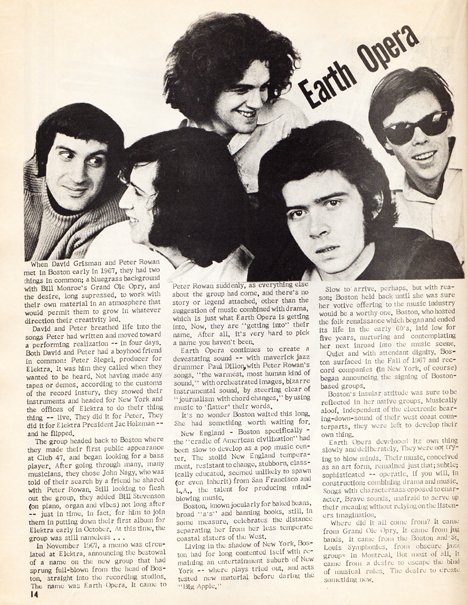
This is the transcription of the article above from the New England Scene Magazine of March 1968 written by Ted Scourtis
When David Grisman and Peter Rowan met in Boston early in 1967, they had two things in common; a bluegrass background with Bill Monroe's Grand Ole Opry, and the desire, long suppressed, to work with their own material in an atmosphere that would permit them to grow in whatever direction their creativity led.David and Peter breathed life into the songs Peter had written and moved toward a performing realization - in four days. Both David and Peter had a boyhood friend in common: Peter Siegel, producer for Elektra. It was him they called when they wanted to be heard. Not having made any tapes or demos, according to the customs of the record industry, they stowed their instruments and headed for New York and the offices of Elektra to do their thing -- live. They did it for Peter. They did it for Elektra President Jac Holzman - and he flipped.
The group headed back to Boston where they made their first public appearance at Club 47, and began looking for a bass player. After going through many, many musicians, they chose John Nagy, who was told of their search by a friend he shared with Peter Rowan. Still looking to flesh out the group, they added Bill Stevenson (on piano, organ and vibes) not long after -- just in time, in fact, for him to join them in putting down their first album for Elektra early in October. At this time, the group was still nameless . . .
In November 1967, a memo was circulated at Elektra, announcing the bestowal of a name on the new group that had sprung full-blown from the head of Boston, straight into the recording studios. The name was Earth Opera. It came to Peter Rowan suddenly, as everything else about the group had come, and there's no story or legend attached, other than the suggestion of music combined with drama, which is just what Earth Opera is getting into. Now, they are "getting into" their name. After all, it's very hard to pick a name you haven't been.
Earth Opera continues to create a devastating sound - with maverick jazz drummer Paul Dillon, with Peter Rowan's songs, "the warmest, most human kind of sound," with orchestrated images, bizarre instrumental sound, by steering clear of "journalism with chord changes," by using music to 'flatter" their words.
It's no wonder Boston waited this long. She had something worth waiting for.
New England - Boston specifically -the "cradle of American civilization" had been slow to develop as a pop music center. The stolid New England temperament, resistant to change, stubborn, classically educated, seemed unlikely to spawn (or even inherit) from San Francisco and L.A., the talent for producing mind-blowing music.
Boston, known jocularly for baked beans, broad "a's" and banning books, still, in some measure, celebrates the distance separating her from her less temperate coastal sisters of the West.
Living in the shadow of New York, Boston had for long contented itself with remaining an entertainment suburb of New York -- where plays tried out, and acts tested new material before daring the "Big Apple."
Slow to arrive, perhaps, but with reason; Boston held back until she was sure her votive offering to the music industry would be a worthy one. Boston, who hosted the folk renaissance which began and ended its life in the early 60's, laid low for five years, nurturing and contemplating her next inroad into the music scene.
Quiet and with attendant dignity, Boston surfaced in the Fall of 1967 and record companies (in New York, of course) began announcing the signing of Boston-based groups,
Boston's insular attitude was sure to be reflected in her native groups. Musically aloof, independent of the electronic bearing-down-sound of their west coast counterparts, they were left to develop their own thing.
Earth Opera developed Its own thing slowly and deliberately. They were not trying to blow minds. Their music, conceived as an art form, remained just that; subtle; sophisticated -- operatic, if you will, in construction; combining drama and music. Brave sounds, unafraid to serve up their meaning without relying on the listeners imagination.
Where did it all come from? It came from Grand Ole Opry. It came from jug bands, It came from the Boston and St. Louis Symphonies, from obscure jazz group' in Montreal. But most of all, it came from a desire to escape the bind of musical rules. The desire to create something new.
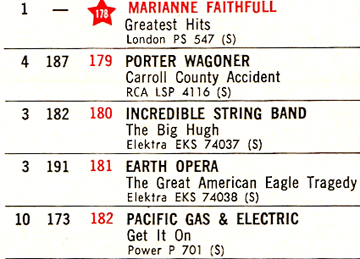 |
 in Billboard Magazine 4/5/1969 |
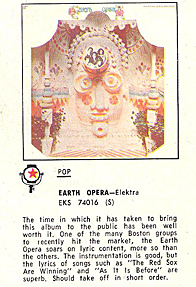 |
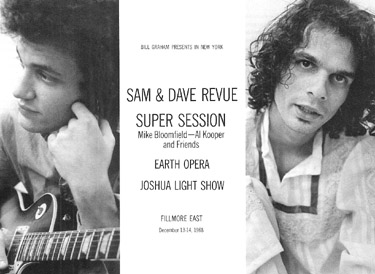 |
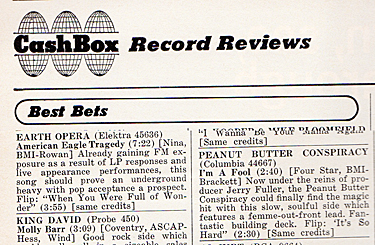 Blurb on first LP in Cashbox Nov. 2, 1968 | |
Home | WLYN | WMBR | Boston Groupie News | Punk Photos | MP3's | Links
Jonathan Richman | Dogmatics Photo | Paley Brother's Story